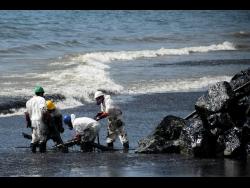Trinidad will receive compensation from a British fund for the ongoing “oil spill cleanup” in sister island Tobago, with initial estimates putting damages at $20 million, The Post reports.
Tobago’s economy is heavily dependent on tourism, an industry that accounts for approximately 50% and 60% of Tobago’s gross domestic product and employment, respectively.
The spill, which has attracted little attention locally, was first discovered on February 7. It has damaged parts of Tobago’s mangrove forests, threatening tourism and fishing industries.
The start of the 2024 Atlantic hurricane season is predicted to be “above normal” with between 17 and 25 named storms, and recent predictions that tourism in the Caribbean will remain strong, along with the oil spill off the Atlantic coast of Tobago, are two examples of the external shocks to which the region’s economy is constantly exposed, and more importantly, the need to plan before these potentially catastrophic events occur.
Jamaica’s recently announced $150 million catastrophe bond, negotiated jointly with the World Bank (International Bank for Reconstruction and Development, IBRD) for designated storm events (catastrophe bond renewal in 2021), the Mexican government’s $360 million catastrophe bond for earthquake and hurricane events in 2024, and the more recent $75 million catastrophe bond issued by the government of Puerto Rico are examples of the proactive strategies that three countries in the region are adopting to manage some of the risks they face.
According to the UN Environment Programme’s 2022 report, preliminary studies are currently being carried out to calculate the total number of pollution events in specific jurisdictions. Records of around 492,000 pollution events have been collated in the UK, US and Canada between 2010 and 2021.
The Deepwater Horizon disaster was the world’s largest oil spill, caused by an explosion on the Deepwater Horizon drilling rig in the Gulf of Mexico on April 20, 2010. The resulting oil slick was 13 times the size of Jamaica. Clean-up costs amounted to $70 billion.
The frequency of these events, based on statistics from three Western countries, suggests that at least five pollution events occur somewhere in the world every 60 minutes. The actual number of daily pollution events is more than double this estimate. They pose a real threat to tourism in the Caribbean, in addition to earthquakes and hurricanes.
That’s because tourism plays a key role in the region’s economy. Prime Minister Andrew Holness said the industry “generates about $60 billion in GDP and provides 2.8 million jobs. About 15.2 percent of jobs in the region are linked to tourism,” he said.
Is enough attention being paid to the threat of oil spills?
Four points from The Gleaner article stood out to me:
• The twin island nation has been contributing to the International Oil Pollution Compensation Fund (IOPCF) for several years. Is this because it is an oil producing country?
• Cleaning and other costs incurred by the Government of Trinidad and Tobago in connection with the event in Tobago will be covered by IOPCF.
• The circumstances under which the Tobago oil spill occurred are unclear. The Trinidad and Tobago government appears to be relying on the investigative capabilities of the IOPCF to determine the cause of the spill and ultimately recover more than $20 million from the insurers of the vessel that caused the spill.
• Although environmental insurance has been around for years, the local insurance industry does not appear to be involved in financing cleanup and other costs: “Environmental pollution liability insurance has traditionally been used to assist in the remediation of contaminated sites and to compensate third parties for losses.”
The UNEP 2022 report argues that “As risk manager, insurer and investor, the insurance industry has a clear opportunity to play a leading role in preventing pollution, reducing greenhouse gas emissions, protecting biodiversity and ecosystems, and supporting the transition to a sustainable economy.” I agree, although some of my insurance colleagues in the region seem to think otherwise.
According to a recent report from the Institute for Energy Economics and Financial Analysis, ExxonMobil “failed to provide adequate insurance for the costs of recovery from a potentially catastrophic oil spill from a major drilling project off the coast of Guyana, the country’s highest court has ruled.” The court found that ExxonMobil made “dishonest attempts” to avoid full liability for any damage that may occur at the Rizawan oil field, part of an offshore project that produces 380,000 barrels of crude oil daily.
“Guyanese taxpayers are now at risk because the judge found ExxonMobil did not provide adequate insurance. The potential consequences for Guyana are devastating,” said Tom Sanzillo, the institute’s director.
Has T&T assessed the threat that a major oil spill poses to its tourism industry? Has it developed a contingency plan to deal with this type of event? Has that plan been tested? Does Jamaica contribute to the International Oil Pollution Compensation Fund? These questions are posed in the context of the specific threat posed to Jamaica’s tourism industry and, more broadly, ongoing offshore oil exploration activities.
The research I did for this article helped me answer the two questions above. According to information available on the International Maritime Organization’s website, the oil spill response exercise took place in February and was intended to “help build capacity and test response systems so that needed improvements to Jamaica’s National Oil Spill Contingency Plan can be identified and implemented.”
The statement reaffirmed the importance of testing the plan, saying, “A comprehensive, up-to-date and tested NOSCP is the foundation of an effective and efficient oil spill preparedness and response framework.”
We would like to thank all those involved in the design and delivery of the training course.
Cedric E Stevens provides independent information and advice on risk management and insurance. For free information and advice please contact aegis@flowja.com or business@gleanerjm.com

